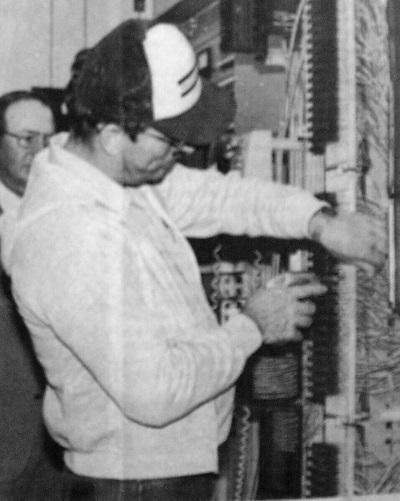Longtime NTCA members look back on the industry upon the association’s 65th anniversary.
By Ashley Spinks, Communications Coordinator, NTCA–The Rural Broadband Association
May 31, 2019
For NTCA member companies, providing cutting-edge telecommunications services to rural communities is often a family affair. As NTCA celebrates its 65th anniversary and looks back on the history of the industry, it’s worth remembering that for many small, rural telcos throughout the country, company legacy is synonymous with family legacy.
Keeping It in the Family
"I’ve been going to customers’ homes and doing repairs on phone lines since I was an eight-year-old.”
Orlean Smith is the general manager of Canadian Valley Telephone (Crowder, OK), and he’s a third-generation operator. His grandfather bought the Canadian, Okla., exchange in 1927; he was a rancher and farmer who decided he needed telephone service to do business. A couple years later, the Great Depression hit the area hard—particularly the town of Crowder, three miles south. According to Smith, “[The Bell Telephone Co.] was going to sell their exchanges and pull out—my grandfather bought the Crowder exchange, intending to use it for parts to keep his own system running.” Before he could get the equipment out, Smith said, “Someone called him on the phone.”—a sign that Canadian Valley had a broader community to serve in Oklahoma.
Thus began the story of Canadian Valley, a story that runs parallel to Smith family history. Smith’s two aunts and grandmother were the telephone company’s original switchboard operators. Every summer, Smith joined his parents in working at the company, he said.
“By 1980, I was old enough to work. I installed cable TV [and] plowed in cable … until my senior year of college. Every summer I’d come home,” Smith said. He didn’t know immediately that he was destined to carry on the family tradition of telco operation. Smith went to college at the University of Oklahoma, got a job at Wrangler’s Menswear and managed a production facility, all in hopes of learning how to successfully run a business, he explained.
In 1992, he said, he got a call from his father with a clear message: “If you want to run a phone company, you better get over here and get to doing it.” Smith took the reins, and he said the continuation of his grandfather’s business is, in hindsight, perhaps the accomplishment he’s proudest of. “There’s not very many companies left that have third-generation operators,” he said. "There’s a zillion stories out there of grandma and grandpa starting the phone company, but they’ve been sold or bought out by bigger companies. Yeah, I’m proud of that.”
For Mike Oblizalo, vice president and general manager of Hood Canal Communications (Union, Wash.), that feeling of pride is likely familiar. Hood Canal is also a family-owned telco, and Oblizalo has been in the industry since he was 16, he said, working alongside his grandfather. His grandfather—who already owned the local hardware store, marina and acted as the town mechanic at the time—purchased the telephone company in 1956.
“I used to ride around with him when I was a kid. … I’ve been going to customers’ homes and doing repairs on phone lines since I was an eight-year-old,” Oblizalo said. In addition to being family- and community-oriented, Oblizalo described the company as versatile and nimble—and perhaps counter-intuitively, attributes its staying power to its relatively small size. When he started, the company had only six employees, so each staff member had a variety of skills— “everyone did everything,” he said. When the company started out, “we used to wear so many hats. You started [a project] at the beginning and saw it through to the end,” Oblizalo explained.
“There’s not very many companies left that have third-generation operators. There’s a zillion stories out there of grandma and grandpa starting the phone company, but they’ve been sold or bought out by bigger companies."
But even as the company has grown—it now has 41 employees—it has remained like a family, Oblizalo said. “We’ve become busier and more specialized in what we do. But it’s been instilled in our organization from my grandfather having the company—that pride and ownership. We know our community is very special,” he said.
Rural Telcos Have Staying Power
Hood Canal is progressive—it started offering broadband in 2000, Oblizalo said, because “being a small company and being a little bit more nimble” (and having a wealth of experience and institutional knowledge, surely) allowed the company to experiment with cutting-edge and emerging technologies. Chris Phillips, general manager of Kalida Telephone Co. (Kalida, Ohio), has been with the company since 1976, and credited its small size with its spirit of collaboration.
“We have nine employees. We wear multiple hats, and if guys get behind, I’ll go out and help, bury a fiber optic line. … it’s always been that way,” he said. “That’s what made the job fun for so many years—one day you might be out burying cable, the next day you’re working on the building itself.”
Small companies stick together. Phillips spoke highly of his peer rural telecom companies in Ohio. He said that in the past, often due to bad weather or some other obstacle, “We’ve helped out neighboring companies. There’s a really good working relationship between small companies. That’s why [we’ve] been able to survive.” In addition to taking care of each other, each rural telco takes seriously its responsibility to its employees. Longtime employees and executives of NTCA member companies share a sense of obligation and concern for the communities in which they do business—oftentimes, they said, they’re the largest employer in town, and they feel a responsibility to treat their friends and neighbors with respect and fairness.
“I’m proud to serve the community,” Oblizalo said. “I feel fortunate to the company for taking care of its employees; that’s been huge for the family life in a rural area. We have good, quality, living-wage jobs … and that dedication to my community has just been instilled in me,” Oblizalo said.
Jason Smith, general manager of Rainbow Communications (Everest, Kan.), knows from personal experience that rural telcos, with the help of the NTCA benefits program, set their employees up for success and financial security—which can have an immense impact on small-town families. “I grew up in a farm family in the late ’70s and early ’80s, and it was tough,” Smith said. “We didn’t have much [and] retirement really wasn’t something that you thought about, because you had to survive today. That’s just the way the farm economy was at the time—it’s one of the pressures of rural America.”
But thanks to NTCA’s Retirement and Savings Plan, as well as his own diligence in contributing over the years, Smith says he’s well-prepared to have a comfortable retirement. “That’s going to allow me to do some other things, and possibly provide a legacy for my children,” Smith said.
"That’s what made the job fun for so many years—one day you might be out burying cable, the next day you’re working on the building itself.”
Constant Change, Consistent Values
Smith, like so many other members and employees of the rural broadband providers in NTCA’s membership, has dedicated decades to his community and the industry. A lot has changed in the 65 years since NTCA was founded. The first wireless “auction” Orlean Smith can remember occurred in 1989—and was conducted by assigning participating companies numbers on ping pong balls. “If your ball got drawn, you got your license,” Smith said. Even then, the small companies had each other’s backs. Smith explained: “Six telcos made an agreement that we’d go all for one, one for all … so [together] we built the first wireless network in our area, probably 80 square miles.”
The consensus today is that broadband is the future—because it’s what’s next in a long tradition of providing the best telecommunications services possible, and because rural communities can’t survive without it. Hood Canal has gone to extraordinary lengths—securing both Rural Utilities Service Community Connect grants and other USDA grants—to expand its service territory and to bring high-speed internet to the Squaxin Island reservation. “We already had been doing their phone system for them, and it was one of our first fiber-to-the-home projects,” Oblizalo said. “There weren’t outside plant products … the electronics were still new, but we did it. And still to this day we use that infrastructure.”
Jason Smith summed it up: “We’re a broadband company now, that’s who we are. That’s where we’re going to keep plowing toward.”
Although the technology has changed, the culture has stayed the same. “The culture of our business is the same today as it was 50 years ago or 80 years ago,” Orlean Smith said. “We put service above all else.” His grandfather was inspired from the beginning, he said, by a simple mantra: “We’re just trying to make a phone operate so that people in the community can have a phone.”




